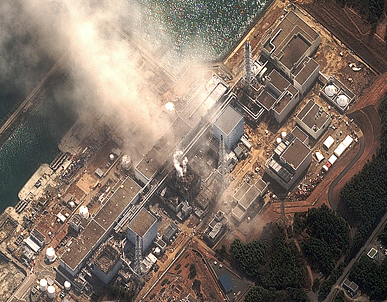It was yesterday when the madness really hit home.
It had been after three days of scanning the internet with an ad-hoc network of fellow journalists, researchers, friends and activists–reading poorly translated Asian news, emails from nuclear experts, and, out of obligation, American puff pieces mostly meant to preserve the power of the Nuclear lobby and lull the public into a terrified stupor–that I got the phone call.
“I don’t want to alarm you,” my friend who also lives in the San Francisco area told me. “But I just got a call from a friend, and he has family in the military, and he was just told that the military is evacuating personnel and their families from California, and keeping it classified. It’s not confirmed, and I don’t want to post a rumor. What should we do?”
For three days I had been asking myself that very same question. What should we do? From the beginning the American media had seemingly decided in advance that this was not something Americans really needed to be worried about…as in, don’t go anywhere, you’re not in danger, just sit there glued to your screens…but be afraid, very afraid!
I knew enough to know we were not completely free of danger. Not only was California in the direct jet stream path of any potential radioactive “death cloud,” but even more ominous were the warnings that the West Coast could be rocked by a similar earthquake in the coming weeks.
By the second day, my network of friends and associates were freely passing around information about potassium iodide to protect against radiation, weather models of the jet stream, independent media reports with more sober and scientifically astute analyses of the situation than the mainstream would offer, and links to ad-hoc radioactivity monitoring groups like the Radiation Network.
We had, informally, as a network of mostly intelligent, mostly-informed, mostly like-minded people, decided we were not being told the truth, and thus, should begin discussing ways to respond to various potential outcomes. We had seen enough with, 9/11, Katrina and the BP disaster to know that the government was neither prepared nor capable (and probably not interested) in helping out in the event of another major catastrophe, and further, had a pattern of lies, obfuscation, and cover ups whenever these things did happen.
That night my partner and I went shopping for emergency supplies, and I spent most of the night trying to calm her anxieties. When we woke up, things in Japan had gone critical, US personnel had been evacuated from the Tokyo area, and the website for the Radiation Network was no longer available. It was into this mix of terrifying new information that I received the call about the military possibly evacuating from California. Can you blame me for giving it even nominal credence?
For the rest of the day I reached out to anyone I knew in the military, or who had family or friends in the military, asking them if they could find out if there was any merit to the rumor at all? And is this something we should expect procedurally and thus take as a cue to do something ourselves?
Much to my surprise, not a single person I contacted thought the idea outlandish, including members of my immediate and extended family. It was a perceptible shift, and it said a lot about the climate of mis- and disinformation permeating the crisis, and the failing lack of any confidence in official sources. For the preceding two days my small cadre of informationistas put out information assessing the true severity of the crisis, and for our efforts we had been assailed as “paranoiacs” and “fearmongers” and castigated for advising preparedness and “fomenting panic.” Although the accusations were just a wee hyperbolic, there was no denying it was in fact gunning down the messenger with a Tek 9.
It was with this criticism in mind that I began to reach out, discreetly, in search of an answer, and found that all were equally concerned and only too willing to help out. A flurry of communication ensued. Thankfully, the network eventually reported back that no one was aware of or had seen any unusual activity. As a kind of unexpected bonus I did receive back quite a bit of nuanced explanation of the military culture which helped assure some that this would not be considered procedure, and was unlikely to happen.
Coincidentally that evening, a number of American news stories appeared essentially mocking those of us who were engaged in some level of preparedness. “Sales of Iodide and Geiger Counters Skyrocket” would be the headline, paired with a sarcastic lede along the lines of, “Despite official assurances that there was absolutely zero danger of any radiation hitting the West Coast, some Americans remain unconvinced and flocked to alternative health retailers in search of potions to protect them.” Y2K and 2012 cliches were recycled. The message was clear: You are crazy if you do anything to help yourself, and we need to make sure we point it out to everyone.
By the morning of the fourth day, the winds had (literally) changed, and it appeared that Japan and China would now lay in the path of any “death cloud.” Without beating you over the head with the metaphor, it was startling to see how quickly and effortlessly the paradigm could shift like the trade winds of the Pacific.
A day earlier I was seriously considering escape routes southeast, and struggled throughout the day to accept that this might be possible. That today, or maybe tomorrow, or next week, or next year, something big like this could easily happen and everything I had known or been or done or planned or dreamed or lost sleep over, would in an instant be washed away in a tsunami of cultural detritus. That the connection we have to this world, and who we think we are, and what we have invested in it, is so tenuous, and so fragile, yet it may be the hardest thing we face letting go of as we watch the world end around us.
Yes, the world is ending. It may or may not go in an apocalyptic cataclysm, but after this week all of us are just a little bit closer to believing it could happen. What is inevitable, what we are seeing right before our eyes, is the end of the old world order (which, ironically, was supposed to be the so-called “New World Order”). Who, in their right mind, can stand up now and say that we are still no more than isolated nations of different peoples separated by vast distances? From my desk in Northern California, on the day after the Tsunami struck, I watched a live video feed of the wave entering San Francisco Bay and terminating on the shores of Emeryville in the East Bay. It is in that wave, and in the radioactive death cloud, that we see and realize our interconnectedness. No more can we pretend to act in the “national interest” when the suffering of billions is happening on our doorstep, and their garbage becomes our garbage.
I may look back and laugh someday about all this, but I doubt it. No one called me crazy for wondering if we should evacuate. In fact, for days it was all anyone would ask me. But in the end, no one wanted to evacuate, least of all me. I spent 40 years trying to find my ideal home, my perfect community, and I finally found it here a year ago, and goddammit I’m not leaving. And neither, it appears, are any of my friends.
From all chaos emerges some order, and what is emerging from this crisis is a greater level of mass consciousness, and that final straw to lay upon the beleaguered back of society: a palpable understanding that our collective situation has become dire enough for action. As I awoke this morning, I found that hundreds of my West Coast friends had convened an ad-hoc meeting online and were discussing how it was time to begin implementing (take a big breath) “community network emergency contingency plans and resource mapping” in order to localize our efforts, so that we will know what to do if the situation in Japan gets worse, or at any future time in which we face a similar, or worse, crisis.
When the system we are told we must put our faith in and depend on leaves us helpless, and then mocks us for trying to help ourselves, it might be time to consider that perhaps its time to break from that system. In fact, we don’t need a system at all. In an age of institutional failure, we–each other–are the solution to the problems we face, which are only, invariably, going to get worse, until we have finally shaken off the plague of the old world order and can proceed again with the business of living, this time, in the manner of our choosing.
Charles Shaw is an award-winning journalist, author of the critically acclaimed memoir, Exile Nation: Drugs, Prisons, Politics & Spirituality, and the Director of the forthcoming documentary, The Exile Nation Project.











